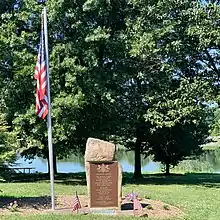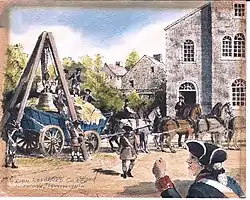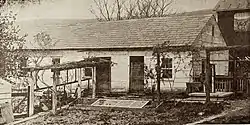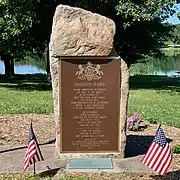Frederick Leaser
Frederick Leaser (1738–1810) was a Pennsylvanian German farmer, patriot and soldier from Lynn Township in Lehigh County, Pennsylvania. He is best known for transporting the Liberty Bell to the Zion Reformed Church in Allentown, Pennsylvania during the American Revolutionary War.[1]
Frederick Leaser | |
|---|---|
 Monument to Frederick Leaser at Leaser Lake, in Lynn Township, Pennsylvania | |
| Born | c. 1738 |
| Died | 1810 |
| Nationality | American |
| Occupation(s) | Farmer, patriot, soldier |
| Known for | Transporting the Liberty Bell to Zion Reformed Church in Allentown, Pennsylvania during the Revolutionary War |
Early life and family

c. 1750, Frederick Leaser, age twelve, accompanied his father, Jacob Leaser, from Switzerland to Philadelphia.[1] At that time, his father acquired one hundred and fifteen acres in what was then Northampton County and is now Lynn Township in Lehigh County.[2]
c. 1757, Leaser served in the French and Indian War (part of the Seven Years' War fought from 1754 to 1763).[1]
Liberty Bell transport
After General George Washington's defeat at the Battle of Brandywine on September 11, 1777, Philadelphia, then capital for the Second Continental Congress, faced imminent attack by the British Army under General Sir William Howe. On September 14, to prevent capture of the city's tower bells, which could be melted into cannonballs, the Supreme Executive Council of the Commonwealth of Pennsylvania ordered that the bells be taken down and transported out of the city. The Liberty Bell from Independence Hall, also known as the State House Bell, was among the bells that was secured on the wagon of John Jacob Mickley and transported north.
The wagon broke down on September 23 in Bethlehem. The bell was then transferred to the wagon of Frederick Leaser, who delivered it on September 24 to the Zion Reformed Church in Allentown, where it was hidden under the church's floor boards for nine months until June 1778 when the British departed Philadelphia.[3]
Personal life
He married Catherine Smith and they had three surviving children: Daniel, Anna Maria, and Maria Dorothea. Daniel Follweiler (1769–1847) married Maria Dorothea Leaser (1769–1828) and inherited the farm after Frederick's death in 1810.[1][2][4]
Legacy
On November 19, 1908, the Liberty Bell Chapter of the Daughters of the American Revolution unveiled the Saving of the Liberty Bell Plaque, describing the efforts of Mickley and Leaser, at Zion Reformed Church in Allentown.[5] Leaser's contribution is recognized at the Liberty Bell Museum within the church.[6]
On November 29, 1928, the Pennsylvania Historical Commission and the Valley Forge Chapter of the Sons of the American Revolution erected a memorial monument near his home.[7] Five direct descendants participated in the ceremony, which drew nearly a thousand people.[8] The site was where Leaser's grandson, Jesse Follweiler, on January 1, 1833 had erected a liberty pole for President Andrew Jackson, transporting the pole on the same wagon used for the Liberty Bell.[9] The monument is now on the shore of Leaser Lake at Jacksonville.[10]
Leaser's homestead, the Frederick and Catherine Leaser Farm, was added to the National Register of Historic Places on January 14, 2004 for its significance in agriculture and architecture.[1][11]
Gallery
 Frederick Leaser Homestead, Lynn Township, c. 1914
Frederick Leaser Homestead, Lynn Township, c. 1914 The Saving of the Liberty Bell Plaque at Zion Reformed Church
The Saving of the Liberty Bell Plaque at Zion Reformed Church Frederick Leaser Monument at Leaser Lake
Frederick Leaser Monument at Leaser Lake
See also
References
- Stauffer, Michael A.; Fries, Paul W. "National Register of Historic Places Inventory Nomination Form: Frederick and Catherine Leaser Farm" (PDF). Pennsylvania Historical and Museum Commission – via CRGIS: Cultural Resources Geographic Information System for Pennsylvania.
{{cite web}}: External link in|via= - Mathews, Alfred; Hungerford, Austin N. (1884). History of the Counties of Lehigh and Carbon, in the Commonwealth of Pennsylvania. Philadelphia: Everts & Richards. p. 303.
- Curtin, Williard S. (1960). "Liberty Bell Shrine". Congressional Record: Proceedings and Debates of the 86th Congress, Second Session. Vol. 106 part 8. p. 9751.
- Roberts, Charles Rhoads; Stoudt, John Baer; Krick, Thomas H.; Dietrich, William Joseph (1914). History of Lehigh County, Pennsylvania, and a Genealogical and Biographical Record of Its Families. Vol. II. Lehigh Valley Publishing Company. p. 375.
- "Memorial to the Patriots Who Safeguarded the Liberty Bell". The Morning Call. November 20, 1908. pp. 5, 14 – via Newspapers.com.
- "Both Patriots to be Honored, On Tablet at Zion Church to Memory of Those Who Hauled Liberty Bell. Leaser's Work is Recognized". The Allentown Leader. November 14, 1908. p. 1 – via Newspapers.com.
- Dedication of the Memorial Tablet to Frederick Leaser at Jacksonville, Lehigh County, Pennsylvania, November 29, 1928. Pennsylvania Historical Commission. 1928.
- "Memorial to Frederick Leaser, who hauled Liberty Bell in 1777, is unveiled in Lynn Township". The Morning Call. November 30, 1928. pp. 5, 11 – via Newspapers.com.
- "Memorial for Fred Leaser. In Honor of Hauling Liberty Bell From Philadelphia to Allentown". The Allentown Leader. October 1, 1908 – via Newspapers.com.
- "Leaser Lake". Lehigh County, Pennsylvania.
It is named after Frederick Leaser, an American patriot who transported the Liberty Bell from Philadelphia to Allentown in 1777
- "National Register Information System – (#03001420)". National Register of Historic Places. National Park Service. November 2, 2013.
External links
- Frederick Leaser at Find a Grave
- "The Saving of the Liberty Bell". The Historical Marker Database.
The bell was then transferred to Frederick Leiser's [sic] wagon